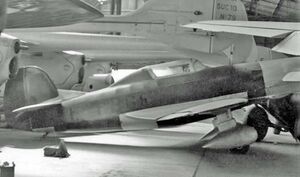Engineering:Max Plan PF.204 Busard
| Max Plan PF.204 Busard | |
|---|---|

| |
| The sole PF.204 Busard stored at Mitry-Mory airfield near Paris in May 1957 | |
| Role | light sporting monoplane |
| National origin | France |
| Manufacturer | Max Plan |
| Designer | Max Plan |
| First flight | 5 June 1952 |
| Introduction | 1952 |
| Retired | by 1963 |
| Primary user | private pilot owner |
| Number built | 1 |
The Max Plan PF.204 Busard was a France -built light sporting monoplane of the early 1950s. Following some modifications it was redesignated as PF.214; a planned derivative, the PF.215, was never made. The plane led to the subsequent construction of the Lefebvre Busard, a single-seat racing aircraft built marketed for homebuilding.
Development
The PF.204 Busard was designed and built by Monsieur Max Plan for personal use as a racing and sporting monoplane. The PF.204 was of all-wood construction with plywood skin. The aircraft was fitted with a fixed cantilever undercarriage enclosed by light alloy fairings.[1]
Operational history
Only one example of the Busard was completed in 1952. By 1956 it had received several modifications, the most noticeable being a revised engine cowling and enlarged cockpit; at this point it was redesignated the PF. 214.[2] At that time there were plans to replace the Minié with a 90 hp (67 kW) Continental C90 4-cylinder horizontally opposed engine, producing the PF.215.
After some years of active flying, it was placed in storage at Mitry-Mory airfield on the northeast outskirts of Paris by May 1957. It no longer appeared on the French civil aircraft register by 1964.[3] By 2006 the aircraft was in storage at the Musée Regional de l'Air,[4] Angers - Loire Airport, France .[5]
Variants
- Max Plan PF.204 Busard
- The original racer, designed and built by Max Plan, powered by a 75 hp (56 kW) Minié 4.DC.32 h4-cyl. horizontally opposed piston engine.
- Max Plan PF.214 Busard
- The sole MP.204 re-designated after modifications to the engine cowling and an enlarged cockpit.
- Max Plan PF.215 Busard
- A planned derivative to have been powered by a 90 hp (67 kW) Continental C90 4-cyl. horizontally opposed piston engine.
Specifications (PF.204)
Data from Green (1956)
General characteristics
- Crew: 1
- Length: 17 ft 7 in (5.35 m)
- Wingspan: 18 ft 1 in (5.5 m)
- Wing area: 65 sq ft (6.0 m2) [2]
- Empty weight: 419 lb (190 kg)
- Gross weight: 728 lb (330 kg)
- Max takeoff weight: 794 lb (360 kg)
- Powerplant: 1 × Minié 4.D.32 4-cylinder horizontally opposed, 75 hp (56 kW)
Performance
- Maximum speed: 130 mph (210 km/h, 110 kn)
- Cruise speed: 99 mph (160 km/h, 86 kn)
- Endurance: 2 hours 30 minutes
Notes
References
- Bridgman, Leonard (1956). Jane's All the World's Aircraft 1956-57. London: Jane's All the World's Aircraft Publishing Co. Ltd.
- Butler, P.H (1964). French Civil Aircraft Register. Merseyside Society of Aviation Enthusiasts.
- Green, William (1956). The Aircraft of the World. Macdonald & Co. (Publishers) Ltd.
- Ogden, Bob (2006). Aviation Museums & Collections of Mainland Europe. Air-Britain (Historians) Ltd. ISBN 0-85130-375-7.
External links
 |

